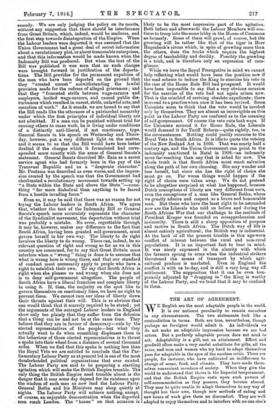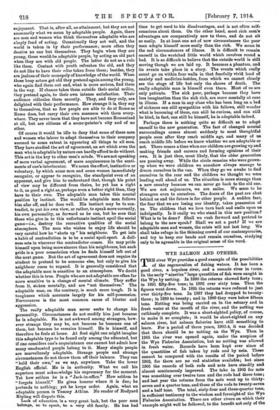THE ART OF AGREEMENT. 1T E English are the most adaptable
people in the world. It is our national peculiarity to remain ourselves in any circumstances. The two statements look like a contradiction in terms. Both are true, nevertheless, though perhaps no foreigner would admit it. As individuals we do not make an adaptable impression because we are bad actors. But a perfectly adaptable person does not need to act. Adaptability is a gift, not an attainment. Effort and goodwill often make a very useful substitute for gifts, all the same, and men and women who try hard to adapt themselves pass for adaptable in the eyes of the careless critic. There are people, for instance, who have cultivated an indifference to change of scene, food, and climate. They have made them- selves convenient members of society. When they give the world to understand that theirs is the Imperial temperament, and that the British Empire rests upon such powers of self-accommodation as they possess, they become absurd. They may be quite unable to adapt themselves to any way of thought but their own, though new methods of eating and new hours of work give them no discomfort. They are well adapted to enjoy themselves and to interfere with no one else's enjoyment. That is, after all, an attainment, but they are not necessarily what we mean by adaptable people. Again, there are men and women who think themselves adaptable who are simply fond of acting. Occasionally they act well, and the world is taken in by their performance ; more often they deceive no one but themselves. They begin when they are young, these would-be adaptable people, by acting an old part when they are with old people. The latter do not as a rule like them. Contact with youth refreshes the old, and they do not like to have their roles taken from them; besides, they are jealous of their monopoly of knowledge of the world. When these busy actors get old they pretend again among the young, who again find them out and, what is more serious, find them in the way. If chance takes them outside their social railieu, they pretend again, to their own intense satisfaction. Their audience ridicules them secretly. They, and they only, are delighted with their performance. How strange it is, they say to themselves, that so few people are able to do at Rome as Rome does, but carry their own manners with them every- where. They never learn that they have not become Roruanized at all, but are citizens of a scene-painter's city and of no other.
Of course it would be idle to deny that some of these men and women who labour to adapt themselves to their company succeed to some extent in appearing all things to all men. They have studied the art of agreement, an art which even the man who is adaptable by nature can hardly afford to do without. This art is the key to other men's minds. We are not speaking of mere verbal agreement, of mere acquiescence in the senti- ments of one's interlocutor. We mean the effort, instinctive or voluntary, by which some men and some women immediately recognize, or appear to recognize, the standpoint even of an opponent, and give him to understand that, though his point of view may be different from theirs, he yet has a right to it, as good a right as, perhaps even a better right than, they have to their own. The adaptable man takes this mental position by instinct. The would-be adaptable man follows him afar off, and he does well. His instinct may be to con- tradict, to put his own view, or rather, to speak more correctly, his own personality, as forward as he can, but he sees that those who give in to this unfortunate instinct spoil the social game—i.e., destroy the recreative qualities of the social atmosphere. The man who wishes to enjoy life should be very careful how he " shuts up " his neighbour. To get into a habit of contradiction is to be a social spoil-sport. A dull. ness sets in wherever the contradictor comes. He may pride himself upon being more sincere than his neighbours, but such pride is a poor consolation when he finds himself left out of the next game. But the art of agreement does not require its student to pretend to be someone else, but only to give his neighbour room to expand. It is generally considered that the adaptable man is sensitive to an atmosphere. We doubt whether this is true. People who are not adaptable are often far more sensitive to a change of mental climate. They suffer from it, sicken mentally, and are "not themselves." The adaptable man, on the contrary, is much more tough. It is toughness which accounts largely for his self-possession. Nervousness is the moat common cause of bluster and aggression.
The really adaptable man never seeks to change his personality. Circumstances do not modify him just because he is adaptable. He is not awkward among strangers, how- ever strange they may be, not because he becomes one of them, but because he remains himself. He is himself, and therefore he feels at home. At first sight one might imagine this adaptable type to be found only among the educated, but if one considers one's acquaintance one cannot but admit how many uneducated people belong to it. Many simple people are marvellously adaptable. Strange people and strange circumstances do not throw them off their balance. They can " hold their own," as we say, anywhere. Take the lower English official. He is in authority. What we call his superiors mast acknowledge his supremacy for the moment. Yet how seldom he is a "Jack-in-office." How seldom he "forgets himself." He gives honour where it is due; be pretends to nothing; yet he keeps order. Again, what an adaptable person is Tommy Atkins. No reader of Rudyard Kipling will dispute this.
Lack of education is a very great lack, but the poor man belongs, so to speak, to a very old family. He has had
time to get used to his disadvantages, and is not often self- conscious about them. On the other hand, most rich men's advantages are comparatively new to them, and do not sit so easily. In at least one set of new circumstances the poor man adapts himself more easily than the rich. We mean in the sad circumstances of illness. It is difficult to remain oneself in the wretched little world which revolves round a bed. It is so difficult to believe that the outside world is still moving though we are laid up. It becomes a phantom, and its events take place in a story. The events which really count go on within four walls in that fearfully vivid land of anxiety and medicine-bottles, from which we cannot clearly see the stage of life but only the shores of death. The really adaptable man is himself even there. Most of us are only patients. The sick poor, perhaps because they have less imagination than the sick rich, are more mentally at ease in illness. If a man in any class who has been long on a bed of sickness can still sympathize with his fellows, still wonder what is becoming of them, can still be curious, and can still be kind, in fact, can still be himself, he is adaptable indeed.
Perhaps there is nothing quite so difficult an to adapt oneself to the new generation. The fact of changed mental surroundings comes almost suddenly to most thoughtful people soon after they reach middle age, and many of us reach middle life before we know whether we are adaptable or not. There comes a time when our children are growing up and making friends and careers and forming opinions of their own. It is just then, most likely, that the older generation are passing away. While the circle remains who were grown- up when we were children we somehow always manage to dream ourselves in the van. When they go we awake to find ourselves in the rear and the children we thought we were leading well ahead of us. The situation is more strange than a new country because we can never go back to the old one. We are not sojourners, we are exiles. We seem to be strangers even to ourselves. The doors of the past are shut behind us and the future is for other people. A sudden fear, the fear that we are losing our identity, takes possession of us. The children that we love turn back and smile upon us indulgently. Is it really we who stand in this new position ? What is to be done ? Shall we rush forward and pretend to belong to the new epoch? Shall we act a part? If we are adaptable men and women, the crisis will not last long. We shall take refuge in the thinning crowd of our contemporaries, and try to keep our heads and remain ourselves, studying only to be agreeable in the original sense of the word.











































 Previous page
Previous page